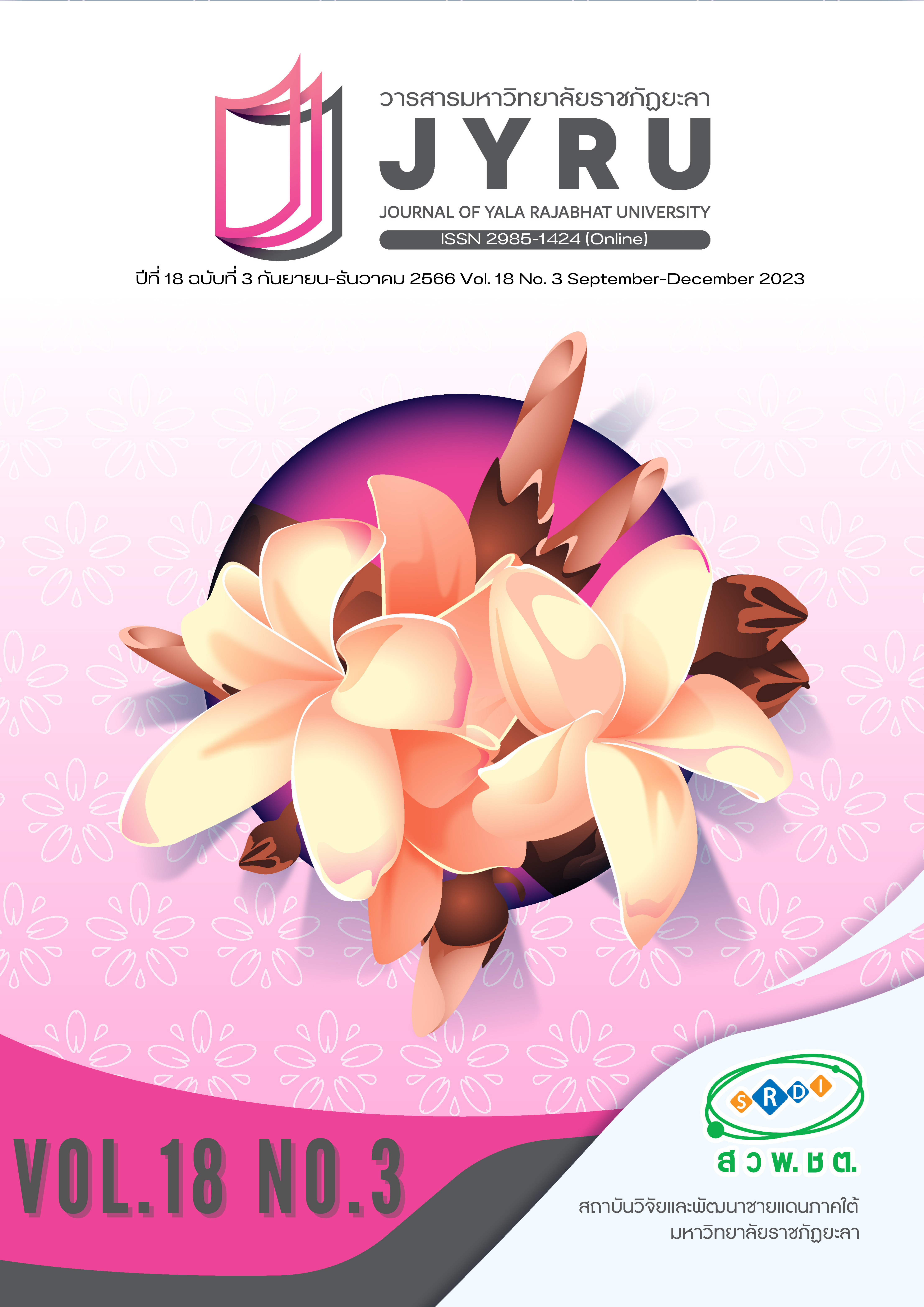The Inquiry Cycle Learning Method with the Application STAD Technique Combines GeoGebra Program to Develop Mathematical Concepts
Main Article Content
Abstract
Mathematics teaching management found that the students had a mathematical misconception that affected mathematics learning at the next level. This study was conducted on learning management approaches based on the inquiry cycle learning method with the application STAD technique combines the GeoGebra program to develop mathematical concepts. The purposes of this study were: 1) to study the inquiry cycle learning method with the application of the STAD technique, which combines the GeoGebra program to develop mathematical concepts on factoring polynomials of the second degree, and 2) to compare mathematical concepts on factoring polynomials of second degree before and after learning management. The participants were 33 grade 8 students of Khaokaew Wittayasan School by purposive sampling method. Research tools consisted of lesson plans and mathematical concept tests. The data were analyzed by content analysis and the Wilcoxon test. The results showed that the learning management consisted of 5 steps as follows: 1) engagement, 2) exploration, 3) explanation 4) elaboration, and 5) evaluation. After the learning management, there were higher mathematical concept scores with statistical significance at the .05 level, explaining that the learning management based on the inquiry cycle learning method with the application STAD technique combines the GeoGebra program to develop mathematical concepts can develop students' mathematical concepts. The results of this study will help providing guidelines for mathematics learning management in order to develop students in various areas, including technology using, problem-solving, and geometric proofs.
Article Details

This work is licensed under a Creative Commons Attribution-NonCommercial-NoDerivatives 4.0 International License.
Copyright Notice articles, information, images, etc. was published in this Journal of Yala Rajabhat University is a copyright of the journal Yala Rajabhat University. If any person or deparment wants to bring all or part of it for publish or take any action. Authorization is required in written form from the Journal of Yala Rajabhat University only.
References
Choi, S. (2010). Motivating students in learning mathematics with GeoGebra. Annals Computer Science Series, 8(2), 65-76.
Inpinit, J. (2016). The development of mathematical conceptual understanding by PBL with STEM education. Master’s Thesis. Ubon Ratchathani University. (in Thai)
Johnson, D. W. & Johnson, R. T. (1994). Learning together and alone: cooperative. New York: Prentice Hall.
Johnson, L. B. (2017). Developing mathematics knowledge. Child Development Perspectives, 11(3), 184-190.
Khaled, H. K. (2014). Conceptual and procedural knowledge of rational numbers for Riyadh elementary school teachers. Journal of Education and Human development, 3(4), 181-197.
Khammanee, T. (2017). Pedagogy: knowledge for effective learning process management (20nd Ed.). Bangkok: Chulalongkorn University Press. (in Thai)
Khammanee, T. (2018). Pedagogy: knowledge for effective learning process management (21nd Ed.). Bangkok: Chulalongkorn University Press. (in Thai)
Khansai, T. (2020). Using GeoGebra program to supplement learning activities through constructivism to develop mathematics achievement on Parabola for Matthayomsuksa 3 students. Journal of Teacher Professional Development, 1(2), 89-96. (in Thai)
Markanong, A. (2014). Mathematics for high school teachers (2nd Ed.). Bangkok: Faculty of Education Chulalongkorn University. (in Thai)
Ministry of Education. (2017). Indicators and learning content of Mathematics (revised edition 2017) (1nd ed.). Bangkok: Printing Cooperative of Thailand. (in Thai)
National Institute of Educational Testing Service. (2021). Basic statistics of O-NET test results, Mattayom 3, academic year 2018-2021 [Online]. Retrieved October 1, 2022, from: https://www.niets.or.th/th/content/view/11821. (in Thai)
Promtrud, A. (2022). Development of conceptual understanding in mathematics of 7th grade students using open approach: classroom action research. CMU Journal of Education, 6(2), 61-75. (in Thai)
Rerai, T. & Kamrat, N. (2021). The Effects of cooperative learning by STAD technique with GeoGebra mathematics on conic section of Matthayomsuksa 4 Students. Social Sciences Research and Academic Journal, 17(3), 171-184. (in Thai)
Sutthirat, C. (2016). 80 Learning management innovations that focus on students (7nd Ed.). Nonthaburi: P Balans Design and Printing. (in Thai)
The Institute for the Promotion of Teaching Science and Technology. (2021). PISA 2018 assessment results reading, mathematics and science (1nd Ed.). Bangkok: The Institute for the Promotion of Teaching Science and Technology. (in Thai)
Thonaboon, J. (2017). The inquiry cycle learning method (5Es) in the 21st century. Lampang: Suan Dusit University Lampang Campus. (in Thai)
Wongyai, J., Jenjit, A., & Nualpang, K. (2016). The effect of organizing the inquiry cycle instructional model (5Es) together with student teams achievement division developing mathematical connection skill in variation for Mathayomsuksa II students. Journal of Education Naresuan University, 18(2), 152-160. (in Thai)
Yommana, K. & Chaipichit, D. (2022). Development of mathematics abilities of primary school student grade 4 by using the open approach and cooperative learning STAD techniques. Journal of MCU Ubon Review, 7(2), 1295-1304. (in Thai)


